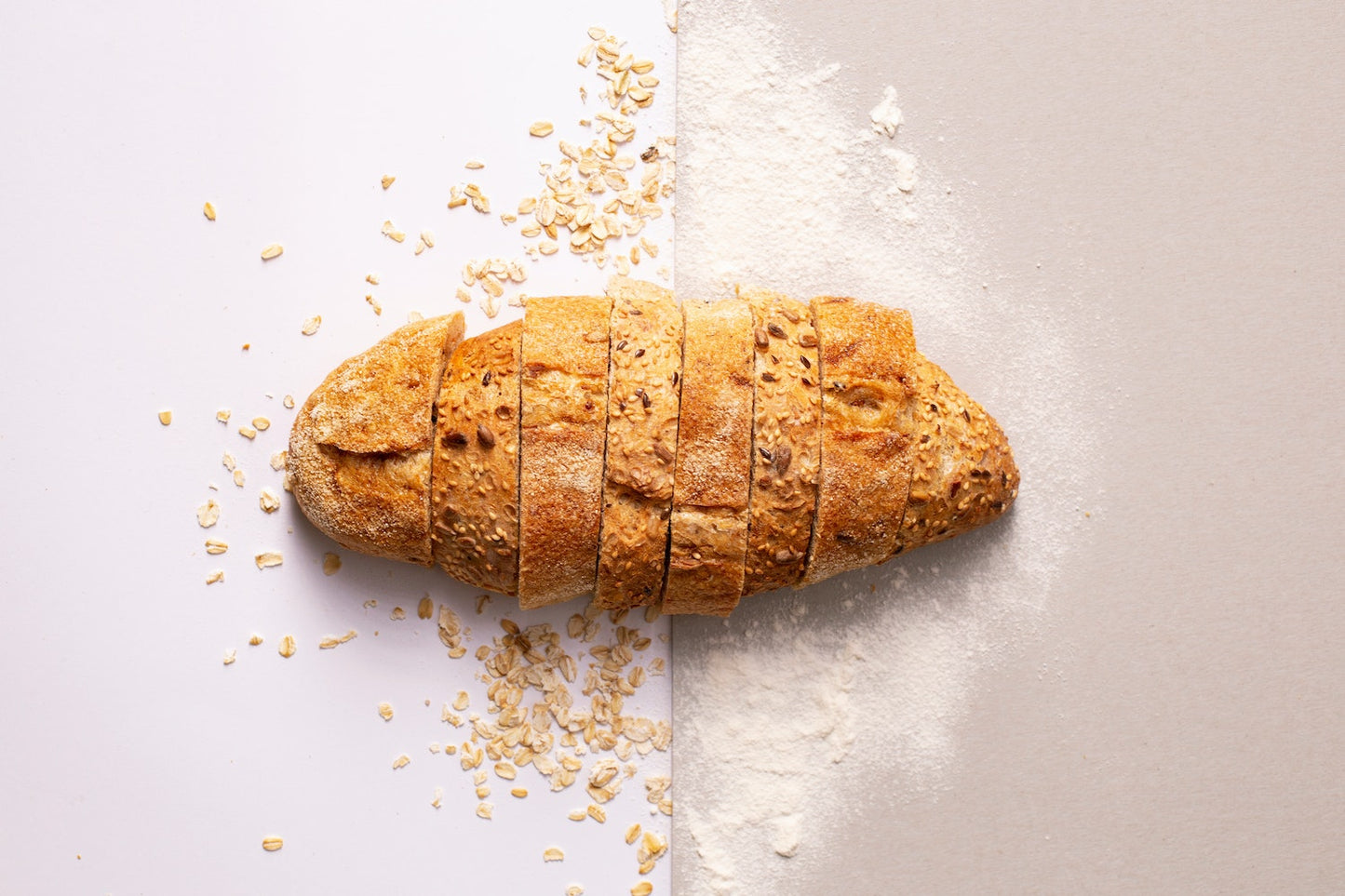
Bloating and Weight Gain: Is There a Connection?
Let's talk about something we've all experienced at some point: bloating and weight gain. You know that uncomfortable feeling of a bloated belly combined with the frustration of unwanted weight creeping in?
Well, we're here to shed some light on whether there's a connection between the two. Get ready for some valuable insights that'll help you understand bloating and weight gain and how they relate to your overall wellness.
What Is Bloating?
Alright, let's start with bloating. It's that feeling of fullness, tightness, or distension in your belly. And guess what? It often comes with excessive gas, making it quite an uncomfortable experience. Bloating usually happens when your digestive system has a buildup of gas or when your abdomen decides to retain some fluid.
Now, it’s important to understand that the exact causes of bloating can vary from person to person. We're talking about anything from certain carbs to underlying medical conditions.
Let's break some of the most common culprits down.
Carbohydrates
Brace yourself, because certain carbs like beans, lentils, and cruciferous veggies (think broccoli and cauliflower) are often common causes of bloating. These foods contain complex sugars that can be a bit tricky for your body to break down, leading to excessive gas production.
Medical Conditions
Here's the deal — bloating can also be a symptom of underlying medical conditions like irritable bowel syndrome (IBS), inflammatory bowel disease (IBD), and gastroesophageal reflux disease (GERD). These conditions mess with your digestive system's normal functioning and can give you bloating and other uncomfortable symptoms.
Excess Gas
Believe it or not, swallowing air while eating or drinking, can result in excessive gas production. This can also happen when your gut bacteria ferment undigested food. And yes, you've guessed it right — that extra gas buildup contributes to abdominal bloating and discomfort.
Lactose
Lactose is a sneaky sugar found in milk and dairy products. Some folks have difficulty digesting it, leading to stomach bloating, abdominal pain, and other not-so-fun digestive side effects. Lactose intolerance, we're looking at you!
Now, here's an important note: while bloating can be distressing, it's usually temporary and harmless. But if you're dealing with persistent bloating, severe abdominal pain, or anything else that worries you, it's wise to reach out to a healthcare professional for a check-up.
What Is the Connection Between Bloating and Weight Gain?
Bloating and weight gain seem to go hand in hand, leaving many people wondering if there's a link. Well, here's the scoop: bloating itself doesn't directly make you gain belly fat, but it can contribute to temporary weight fluctuations and that heavy feeling you might experience.
One way bloating can mess with your weight is through water and fluid retention. When your body holds onto water, it leads to temporary weight fluctuations and a bloated sensation in your belly. Water retention can happen due to various factors, including hormonal changes, food choices, and even gastrointestinal issues.
Oh, and let's not forget about constipation! When you're dealing with infrequent bowel movements or difficulty passing stool (we've all been there), it can contribute to a bloated stomach and the feeling of being weighed down. When waste material chills in your colon for too long, it causes your abdomen to puff up, resulting in temporary weight gain from the retained stool.
Now, here's the thing: while bloating itself doesn't directly cause obesity or substantial weight gain in terms of more body fat, there might be a connection between chronic bloating and obesity.
You see, people who frequently experience bloating might be more inclined to make poor dietary choices or overeat to find some relief. And guess what? Over time, these behaviors can cause you to gain weight and increase your risk of obesity.
What Factors Contribute to Bloating and Weight Gain?
Alright, now it's time to get to know the factors that contribute to bloating and weight gain. The more you understand these factors, the better equipped you'll be to make informed choices about your diet and lifestyle. Here are some key players.
Water Weight
As we mentioned earlier, water retention can mess with your weight and give you a bloated appearance. Your food choices can also influence water retention, so it’s important to keep an eye on your diet and avoid overly processed foods.
Hormonal Changes
Hormonal fluctuations, especially during the menstrual cycle, can contribute to water retention and bloating. Estrogen and progesterone play a role in fluid balance, which can lead to bloating and temporary weight gain, which is a common symptom of PMS.
Food Intolerances
Some folks have food intolerances or sensitivities that can cause bloating and discomfort. Lactose and gluten intolerance are common culprits. When you consume these foods, they can trigger bloating and, in some cases, weight gain due to water retention going into overdrive.
A High-Fiber Diet
Fiber is fabulous for digestion and overall health, but it can also give you some temporary bloating, especially if you make a sudden transition to a high-fiber diet. Fiber absorbs water in your digestive tract, leading to a feeling of fullness and — yep — bloating.
Processed Foods
Ah, those processed goodies we sometimes can't resist. They often contain high levels of sodium, artificial additives, and preservatives that can mess with your body's water balance. Excess salt in these foods can also make your body retain water, resulting in temporary weight gain and bloating.
Can Probiotics and Supplements Help?
Alright, let's dive into some potential solutions for managing bloating and weight gain. Incorporating probiotics and other supplements into your routine might just give you some relief.
Let's break it down.
Probiotics and Gut Health
Probiotics are like the superheroes of bacteria, keeping your gut environment in tip-top shape. They help balance the microbial composition in your digestive tract, which can have a positive impact on digestion and nutrient absorption.
By promoting a diverse and thriving gut microbiome, probiotics may help ease bloating caused by imbalances in gut bacteria. Pretty cool, right?
Weight Loss and Probiotics
Now, let's clear something up. Probiotics alone won't magically make you lose weight, but they can contribute to overall weight management. A healthy gut microbiome supports efficient digestion and metabolism, which are crucial for maintaining a healthy weight.
And get this — certain strains of probioticshave been linked to a reduction in appetite and cravings, potentially supporting your weight loss efforts. Who knew those little bacteria had such potential?
Supplements for Digestion
Besides probiotics, there are other supplements that can aid digestion and relieve bloating. For example, digestive enzymes are pretty nifty at breaking down food effectively, reducing the chances of bloating caused by undigested carbs or fats.
And if you're dealing with constipation-related bloating, fiber supplements like psyllium husk or glucomannan can promote regular bowel movements and provide some relief.
Practical Tips for Managing Bloating
Alright, now it's time for some practical tips and lifestyle changes that can help you manage bloating and maintain a healthy weight.
These strategies are worth a shot:
Get Regular Exercise and Physical Activity
Time to get moving! Engaging in regular exercise and staying physically active can support healthy digestion, reduce bloating, and promote overall well-being. Try a mix of cardio, strength training, and core-focused activities to keep things interesting.
Maintain a Healthy Weight
Strive for a healthy weight by embracing a balanced diet and regular exercise routine. Focus on consuming a variety of nutrient-dense foods, including options rich in potassium and magnesium, like bananas, spinach, and nuts.
Manage Carbohydrate Intake
For some people, certain carbs, like those in cruciferous vegetables or legumes, can trigger bloating due to sensitivity. Pay attention to how your body reacts to different carbs and adjust your intake accordingly. It's all about finding what works best for you!
Try Home Remedies
If you're into natural remedies, here's a tip: Sip on some peppermint tea, or give peppermint oil capsules a try. Peppermint has traditionally been used for its ability to soothe the digestive system, which can help alleviate bloating and promote digestive comfort. A little minty freshness goes a long way!
Understand Cravings and Addressing Them
Cravings can sometimes lead us astray, causing us to overeat or make unhealthy food choices. And you know what that means – hello, bloating and weight gain! Pay attention to your cravings and explore healthier alternatives or strategies to address them. Look for satisfying and nutrient-dense options to keep those cravings in check.
Use Laxatives With Caution
Laxatives should be used sparingly and with the guidance of a healthcare provider. Depending too heavily on them can mess with your natural digestive rhythm and potentially worsen bloating. Not to mention, they can also lead to dehydration.
Importance of Regular Bowel Movements
Maintaining regular bowel movements is vital for preventing constipation and reducing bloating. Stay hydrated, chow down on fiber-rich foods, and prioritize a healthy lifestyle to keep your digestive system happy and regular.
The Bottom Line
Alright, folks, we've covered a lot about bloating and weight gain in this article. We've explored the causes, discussed strategies for relief, and emphasized the importance of maintaining a healthy gut.
But remember, each person is unique, and what works for one may not work for another. For personalized advice tailored to your specific needs, it's always a good idea to consult a nutritionist or healthcare provider. They can assess your situation, consider any underlying medical conditions, and provide guidance that suits your individual circumstances.
And hey, if you're on the lookout for a natural solution to help with bloating, why not consider giving Dr. Kellyann's bone broth products a go? Bone broth is known for its soothing effects on the digestive system and can provide nourishment while also supporting gut health.
So remember: you're the boss of your health journey! With the right knowledge and support, you can find relief from bloating and embrace a life of optimal well-being. Take proactive steps, prioritize your digestive health, and empower yourself to live a bloating-free life. You've got this!
Sources:
Bloating: Causes and Prevention Tips | Johns Hopkins Medicine
Intestinal Gas from Complex Carbohydrates or Lactose Intolerance | Gastrointestinal Society
Abdominal Bloating | MedlinePlus Medical Encyclopedia
Definition & Facts for Lactose Intolerance | NIDDK
Constipation; Symptoms, Causes, Treatment & Prevention | Cleveland Clinic
Management Strategies for Abdominal Bloating and Distension | PMC
Probiotics: How Effective Are They in the Fight against Obesity? | PMC







